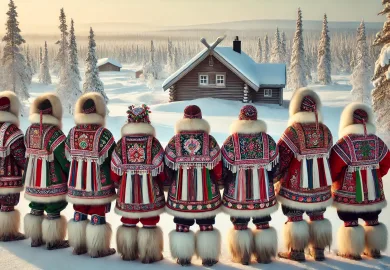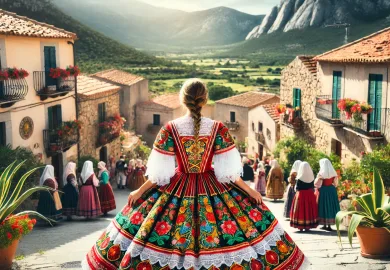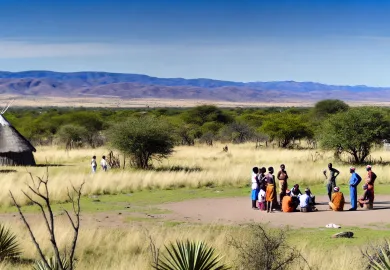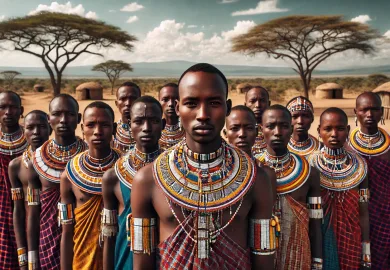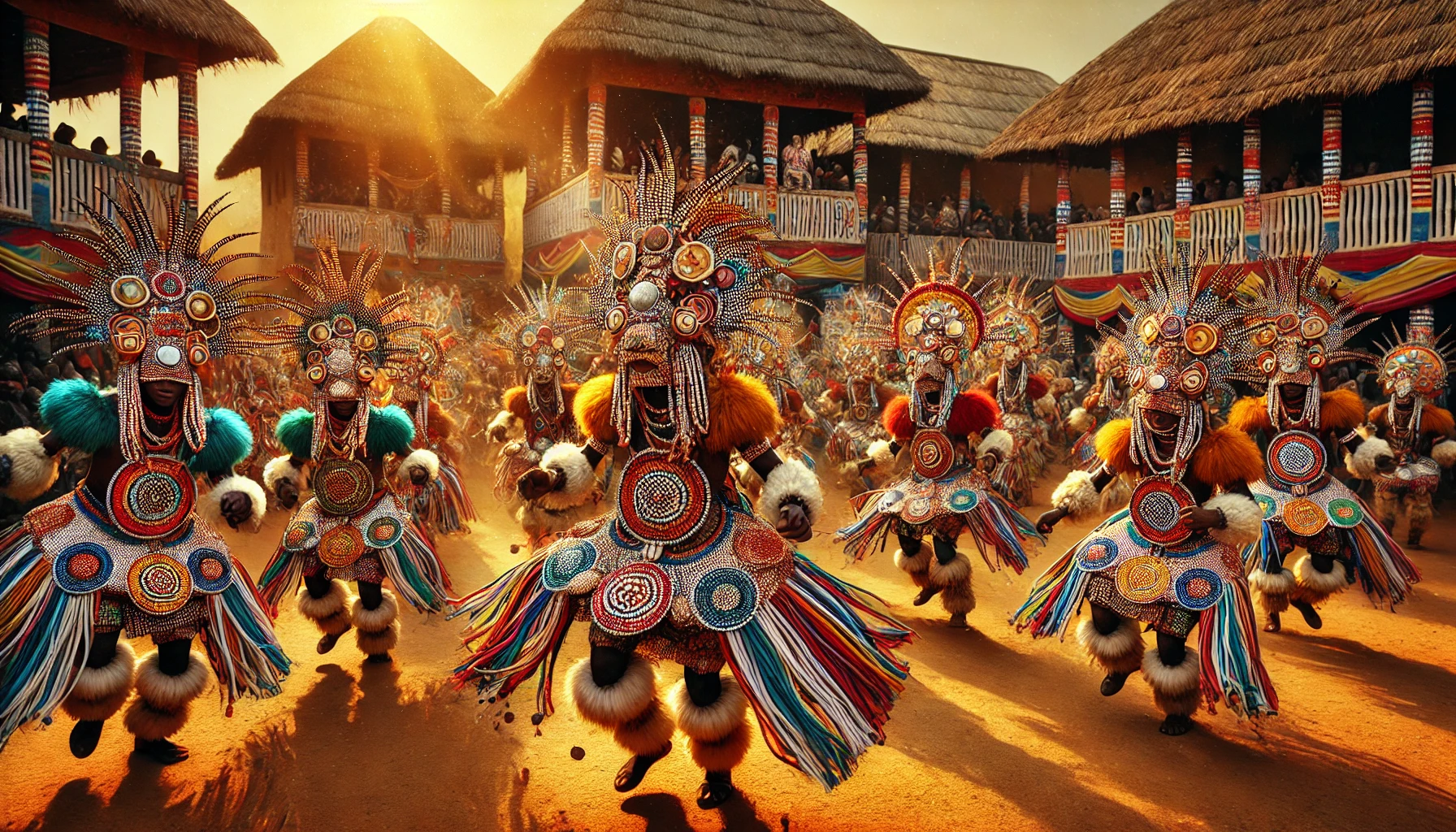
Benin, a country rich in history and culture, is home to many spiritual traditions that have been preserved for centuries. Among these is the fascinating practice of Egungun, also known as “Living Ghosts.” Egungun is more than just a spiritual entity; it represents a complex cultural heritage that continues to thrive in the heart of Dakon village. This article delves into the mystical world of Egungun, exploring its significance, rituals, and the enduring impact it has on the people of Dakon.
The Significance of Egungun in Beninese Culture
Egungun holds a place of immense significance in Beninese culture, particularly among the Yoruba people. This spiritual practice is centered around the belief in ancestral spirits who, through the Egungun masquerade, return to the physical world to offer guidance, protection, and blessings to their descendants. The Egungun are seen as intermediaries between the living and the dead, maintaining a vital connection between the two worlds.
In Dakon village, the Egungun festival is one of the most anticipated events of the year. During this time, the entire community comes together to honor their ancestors and celebrate their enduring presence in the lives of the living. The festival is marked by vibrant performances, elaborate costumes, and rituals that have been passed down through generations. The Egungun are believed to embody the spirits of the departed, and their appearance is both awe-inspiring and revered.
The significance of Egungun goes beyond mere tradition; it is a way of life that influences the social, cultural, and spiritual fabric of the community. The rituals associated with Egungun are deeply symbolic, representing the cyclical nature of life and death, and the belief that the spirits of the ancestors continue to watch over their descendants. For the people of Dakon village, Egungun is a living tradition that connects them to their past while guiding their present and future.
The Rituals and Ceremonies of Egungun
The Egungun festival in Dakon village is a time of elaborate rituals and ceremonies that are steeped in symbolism and tradition. The preparation for the festival begins months in advance, with the community elders and priests playing a crucial role in ensuring that every aspect of the celebration is carried out according to ancient customs.
One of the most important rituals is the creation of the Egungun costumes, which are crafted with meticulous care and attention to detail. These costumes are often made from layers of colorful fabrics, adorned with beads, shells, and other sacred items. Each costume is unique and is believed to hold the essence of the ancestor it represents. The process of making these costumes is itself a sacred act, involving prayers, chants, and offerings to the spirits.
The ceremonies during the festival are a blend of dance, music, and drama, with the Egungun performers taking center stage. The performers, who are usually male, are considered to be possessed by the spirits of the ancestors while they wear the Egungun costume. As they dance through the village, their movements are believed to be guided by the spirits, and their presence is both feared and respected by the onlookers. The dances are accompanied by the rhythmic beats of drums, which are said to summon the spirits and amplify their power.
The festival also includes various offerings and sacrifices to honor the ancestors and seek their blessings. These offerings often include food, drinks, and animals, which are presented at sacred shrines dedicated to the Egungun. The rituals culminate in a grand procession, where the Egungun performers lead the community in a celebration of life, death, and the eternal connection between the two.
The Role of Elders and Priests in the Egungun Tradition
The elders and priests of Dakon village play a vital role in the preservation and transmission of the Egungun tradition. They are the custodians of the sacred knowledge and rituals that have been passed down through generations, and their guidance is essential to the success of the festival. The elders, who are often the most respected members of the community, are responsible for selecting the individuals who will perform as Egungun and for ensuring that the rituals are carried out correctly.
The priests, on the other hand, serve as the spiritual leaders of the community. They are responsible for communicating with the spirits of the ancestors and interpreting their messages for the living. The priests perform various rituals to invoke the presence of the Egungun and to seek their guidance and protection. They also play a key role in the preparation of the Egungun costumes, ensuring that they are imbued with the necessary spiritual power.
The relationship between the elders, priests, and the Egungun performers is one of mutual respect and collaboration. The performers rely on the wisdom and experience of the elders and priests to guide them through the complex rituals and to ensure that they are properly prepared for their role. The success of the Egungun festival depends on the harmony and cooperation between these different members of the community, each of whom plays a crucial role in maintaining the tradition.
The elders and priests also play an important role in educating the younger generation about the significance of Egungun. They ensure that the knowledge and rituals are passed on to the next generation, preserving the tradition for the future. This transmission of knowledge is not only important for the continuity of the Egungun tradition but also for the preservation of the cultural identity of the community.
The Impact of Egungun on the Social Fabric of Dakon Village
The Egungun tradition is not just a spiritual practice; it is a social institution that has a profound impact on the community life of Dakon village. The festival is a time when the entire community comes together, transcending social and economic divisions. It fosters a sense of unity and belonging among the villagers, as they collectively honor their ancestors and celebrate their shared heritage.
The social impact of Egungun can be seen in the way it reinforces communal values and norms. The festival serves as a reminder of the importance of respecting the elders, maintaining family ties, and upholding the traditions of the community. The presence of the Egungun, who are believed to embody the spirits of the ancestors, reinforces the idea that the actions of the living are being watched and judged by those who have passed on. This belief encourages individuals to adhere to the moral and ethical standards of the community.
Egungun also plays a role in conflict resolution and social cohesion. The festival provides an opportunity for individuals to seek forgiveness for past wrongs and to reconcile with those they may have wronged. The Egungun, acting as intermediaries between the living and the dead, are believed to have the power to mediate disputes and restore harmony within the community. This aspect of the tradition underscores the importance of peace and unity in Dakon village.
Furthermore, the Egungun festival is an important occasion for the transmission of cultural knowledge and values. Through the rituals, dances, and songs, the younger generation is taught about their history, traditions, and the significance of the Egungun. This transmission of knowledge helps to preserve the cultural identity of the community and ensures that the tradition continues to thrive.
The Future of the Egungun Tradition in Dakon Village
The Egungun tradition has survived for centuries in Dakon village, but like many indigenous practices, it faces challenges in the modern world. The influence of globalization, urbanization, and the spread of modern religions has led to changes in the way the tradition is practiced and perceived. However, the people of Dakon are determined to preserve their cultural heritage and ensure that the Egungun tradition remains a vital part of their community.
One of the challenges facing the Egungun tradition is the diminishing number of individuals who are knowledgeable about the rituals and willing to take on the role of Egungun performers. The younger generation, influenced by modern education and lifestyles, may not always appreciate the significance of the tradition or see it as relevant to their lives. This has led to concerns about the continuity of the tradition and the preservation of the cultural knowledge associated with it.
However, efforts are being made to address these challenges and to revitalize the Egungun tradition. Community leaders and elders are actively working to engage the younger generation in the practice and to instill in them a sense of pride in their cultural heritage. This includes organizing workshops, cultural programs, and educational initiatives that teach the history and significance of Egungun. There is also a growing recognition of the importance of preserving the tradition as a means of maintaining the cultural identity of the community.
The future of the Egungun tradition in Dakon village will depend on the ability of the community to adapt to changing circumstances while staying true to the essence of the practice. This will require a delicate balance between preserving the ancient rituals and allowing for innovation and adaptation in response to modern influences. If successful, the Egungun tradition will continue to thrive, providing a source of spiritual and cultural strength for generations to come.
In conclusion, the Egungun tradition in Dakon village is a powerful expression of the cultural and spiritual heritage of the community. It is a living tradition that connects the past with the present and reinforces the values and beliefs that define the community. Despite the challenges it faces, the people of Dakon are committed to preserving this important aspect of their culture and ensuring that the Egungun tradition remains a vibrant and integral part of their lives.
Warm and Welcoming People
In Benin, one of the most cherished aspects that visitors frequently remark on is the warmth and hospitality of its people. The locals of Benin have a deeply rooted tradition of welcoming outsiders with open arms, a practice embedded in the culture for generations. This warm reception goes beyond just friendly smiles; it’s about genuine interest and respect, making tourists feel at home from the moment they arrive.
Whether in bustling cities or quaint rural villages, the people of Benin are known for going out of their way to make visitors feel comfortable. It’s common for locals to offer directions, share insights about hidden spots, or even invite travelers for a meal. This openness to strangers is not only a mark of respect but also a way to share their culture and heritage, allowing tourists to experience the authentic soul of the country.
This warmth makes a visit to Benin more than just a journey to a new place; it becomes a memorable experience of human connection. By the end of their stay, many travelers feel they’re leaving not just a beautiful landscape but also newfound friends. It’s this unique combination of natural beauty and heartfelt hospitality that makes Benin an unforgettable destination, resonating in the memories of everyone who has had the pleasure of experiencing it.



